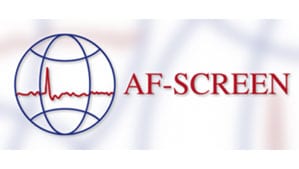The multicentre, randomized trial, SCREEN-AF, coordinated by PHRI, has demonstrated that a wearable heart monitor device can significantly improve the detection of atrial fibrillation (AF), which is a major risk factor for stroke. Trial results were published today in JAMA Cardiology.
The study, a collaboration between researchers in Germany and Canada tested a miniature, adhesive heart monitor. Half of 856 participants wore the monitor on their chest for up to four weeks; the other half of participants received standard medical care. All aged 75 years or older with high blood pressure but no previous diagnosis of AF, the participants were followed for six months.

David Gladstone
The transatlantic researchers found that the portable heart monitor, well-tolerated by participants, led to a tenfold increase in the detection of AF. One out of every 20 patients in the monitoring group was found to have a new diagnosis of AF.
Proactive screening for asymptomatic individuals
“The big challenge is that atrial fibrillation is often a silent risk factor that can be difficult to detect with current methods,” says David Gladstone, the study’s principal investigator and a stroke neurologist from Sunnybrook Health Sciences Centre and Department of Medicine in the University of Toronto Temerty Faculty of Medicine.
“Proactive screening like this for AF is not currently being done for asymptomatic individuals,” he notes, “though we routinely screen for high blood pressure, diabetes, cholesterol, and some cancers, in clinical practice.”

Jeff Healey
The JAMA Cardiology publication’s senior author, Jeff Healey, a PHRI Senior Scientist in the arrhythmia research program, notes that “the SCREEN-AF trial will help to inform the world on the role of AF screening in stroke prevention.” He is a founding member of the Canadian Stroke Prevention Intervention (C-SPIN) Network which helped connect researchers in Canada and Germany, and boosted the efficiency of SCREEN-AF as a joint venture.
Other coauthors on this paper include PHRI’s Stuart Connolly, William McIntyre, Jorge Wong, and Alexander Benz.
Could screening for silent AF prevent stroke? from iRhythm Marketing on Vimeo.
Blood thinners for new incidences of AF
Of the trial participants who was found to have a new incidence of AF, 75% were prescribed a blood thinner medication, which can lower the risk of stroke by nearly 70%.
“These results are an important step towards stroke prevention by early detection of atrial fibrillation. Blood thinners for AF can lower the risk of stroke by nearly 70 per cent. However, more data is needed to determine whether the approach used in SCREEN-AF reduces strokes,” says Rolf Wachter, co-principal investigator and cardiologist at the University Hospital in Leipzig, Germany and scientist at the German Center for Cardiovascular Research (DZHK).
The researchers note that not all heart monitoring devices, wearable or smartphone applications are designed to detect atrial fibrillation. The investigators also emphasize that more research is needed before the results can be implemented widely. Dr. Gladstone adds, “These study results are encouraging and now support the need for large clinical trials to determine the overall impact of screening on the occurrence of stroke and other patient outcomes.”
Atrial fibrillation screening for stroke prevention: a global effort
Jeff Healey is excited about what the near future holds in AF screening, with this trial as well as other undertakings. He is on the steering committee of the five-year-old AF Screen International Collaboration, whose membership spans 37 nations and is coordinated by PHRI. This global collaboration provided networking and communications support for the SCREEN-AF trial including face-to-face meetings with the lead investigator.
As well, he notes, “the AF-Screen Collaboration will serve an important role in the dissemination of trial results and, in collaboration with the AFFECT-EU program (European Union Horizon’s 2020 grant, led by Dr. Renate Schnable in Hamburg), will conduct a patient-level meta-analysis of all similar, large studies of AF screening conducted across the world.”
PHRI contributed an experienced team of research personnel to the SCREEN-AF study, as well as financial, statistical and logistical support, to this important study, and look forward to many more international collaborations in this field.
As well as C-SPIN support, the SCREEN-AF trial was supported by the German Center for Cardiovascular Research (DZHK), supplemented by funding from Boehringer Ingelheim and in-kind support from Microlife Corporation ManthaMed, and iRhythm Technologies Inc.
Banner photo: iRhythm Technologies



